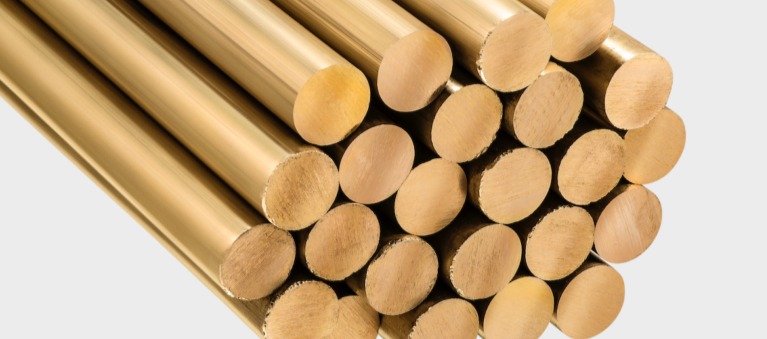ALUMINUM BRONZE
Aluminum bronze is a popular material for condenser tubes, used in various industrial applications due to its excellent properties.
Composition and Properties:
- Material Composition:Aluminum brass typically consists of copper (Cu), aluminum (Al), and a small amount of iron (Fe). The typical composition is around 76-78% copper, 1.8-2.5% aluminum, and 0.05-0.20% iron.
- Corrosion Resistance:Aluminum brass is known for its excellent resistance to corrosion, especially in marine environments where seawater is a concern. The addition of aluminum helps in forming a protective oxide layer on the surface, which enhances its resistance to corrosion.
- Thermal Conductivity:This material has good thermal conductivity, making it effective in heat transfer applications. The thermal conductivity is lower than pure copper but still sufficient for effective heat exchange.
- Mechanical Properties: Aluminum brass tubes have good mechanical strength and durability. They can withstand high pressures and temperatures, which is essential for their use in condensers and heat exchangers.
GRADES
ASTM B 111 C 68700 / ASME SB 111 C 68700:
- ASTM B111: Standard Specification for Copper and Copper-Alloy Seamless Condenser Tubes and Ferrule Stock.
- ASME SB111: Similar to ASTM B111 but used in boiler and pressure vessel applications.
- C68700:Designation for aluminum brass in these standards
BS 2871 Part 3 CZ-110:
- BS 2871 Part 3:Specification for copper and copper alloy tubes suitable for refrigeration and air conditioning.
- CZ-110: Designation for aluminum brass alloy in British Standard.
EN 12451 / CuZn20Al-us-CW702R:
- EN 12451 Copper and copper alloys – Seamless, round tubes for heat exchangers.
- CW702R: European designation for aluminum brass.
NFA 51 102 / CuZn22Al2:
- NFA 51 102: French standard for copper and copper alloys.
- CuZn22Al2: Designation in the French standard for aluminum brass.
JIS H 3300 C 6870:
- JIS H 3300: Japanese Industrial Standard for copper and copper alloy seamless tubes.
- C6870: Designation for aluminum brass in Japanese standards.
Applications:
- Marine Industry: Due to its excellent corrosion resistance, aluminum brass is commonly used in marine applications, such as in ship condensers, oil coolers, and heat exchangers.
- Power Plants: These tubes are used in power plants for condensers and heat exchangers, particularly where seawater is used for cooling.
- Desalination Plants: Aluminum brass is often used in desalination plants for evaporators and heat exchangers due to its resistance to saline environments.
- Chemical Industry: The chemical industry uses these tubes in various applications where both high thermal conductivity and resistance to corrosive chemicals are required.
